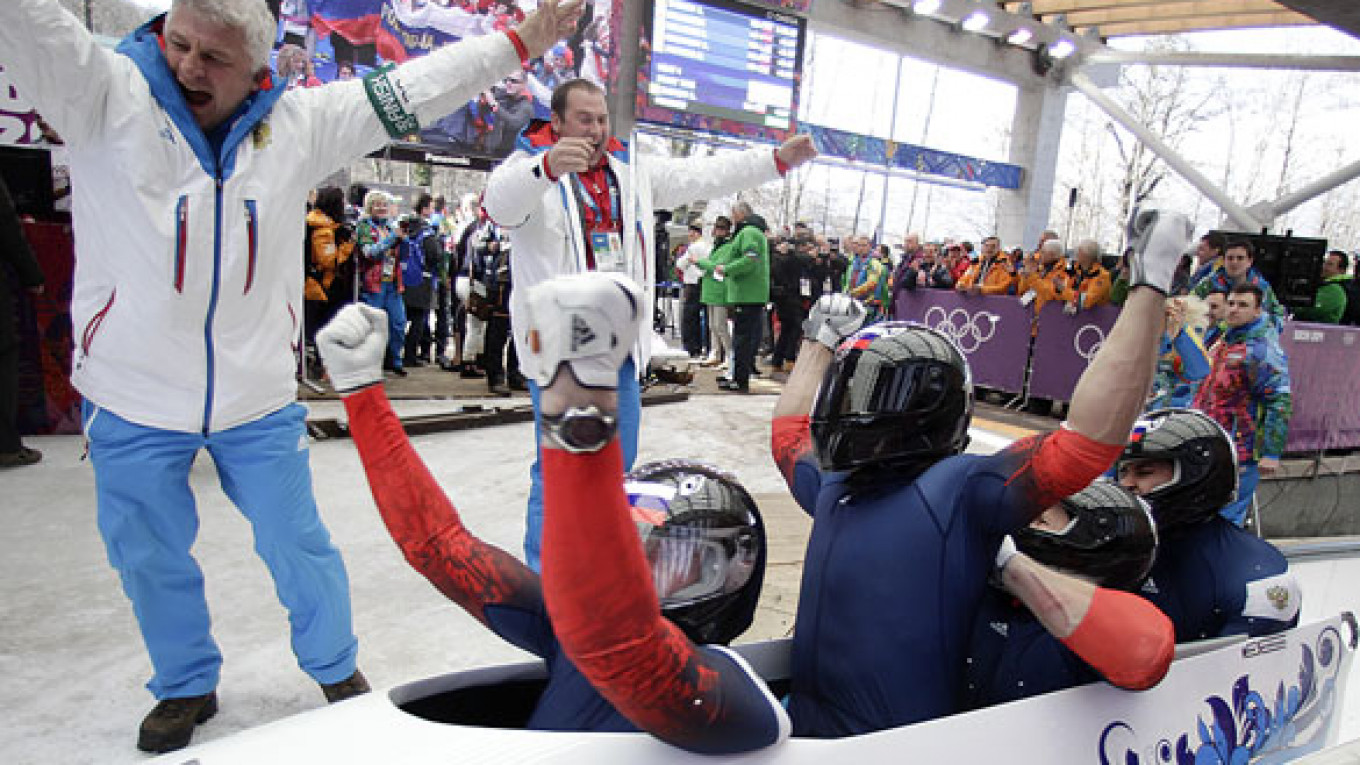KRASNAYA POLYANA — Alexander Zubkov was given a daunting assignment for his home Olympics. His task: Take to Russian ice and make history, against drivers who have been beating him for years.
Do svidaniya, world! Zubkov was uncatchable.
He drove Russia to victory in the four-man bobsled race on Sunday, adding that gold to his two-man win from earlier in the Sochi Games and making him the sixth pilot to sweep those events at an Olympics. Until now, no one had ever achieved that feat on home ice, but this track was built for Zubkov and he proved to be its master.
So, history for Russia. History for Latvia and the U.S., as well.
Oskars Melbardis of Latvia drove to the silver medal, matching his nation's best showing in a Winter Olympic event. And 2010 four-man champion Steven Holcomb of Park City, Utah, piloted USA-1 to bronze, ceding his Olympic title but winning his third career medal — tying the most by any U.S. bobsledder — and giving his nation seven sliding medals at the Sochi Games, tops among all countries.
Zubkov had a slim lead entering Sunday's final two runs and predicted the title would be decided in the third heat. Naturally, he was right.
The field — with just 0.17 seconds separating first through fourth places entering the day, the closest margin in Olympic four-man history — thinned out considerably in Sunday afternoon's opening run. Zubkov's lead over Melbardis swelled to 0.17 seconds. Melbardis opened up an 0.28-second edge over Holcomb for second place. Holcomb was 0.15 seconds better than Russia's Alexander Kasyanov in the race for bronze.
Zubkov, with push athletes Alexei Negodailo, Dmitry Trunenkov and Alexei Voyevoda in his sled, took one look at the standings after the leaders finished their third runs, clenched a fist and punched the air.
He knew it was over.
And a 39-year-old driver who had not won a single two- or four-man race all season on the World Cup circuit was soon declared perfect in Sochi. Zubkov wound up 0.09 seconds faster than Melbardis, who was 0.30 seconds up on Holcomb.
"I talked to Zubkov a couple years ago and asked him the first day he slid, and he told me he was 6 years old," said U.S. bobsledder Justin Olsen, a push athlete in the USA-2 sled piloted by Nick Cunningham that finished 12th. "So he has been sliding for 33 years. Holcomb has been sliding since 2001."
Holcomb got his gold at Vancouver four years ago, ending a 62-year drought for the U.S. in that race. He also won two-man bronze in Sochi, ending a 62-year medal drought for the U.S. in the discipline. So, of course, at these Games he became the first U.S. pilot to win medals in both Olympic races in … yep, 62 years.
Holcomb was joined in the sled by Curt Tomasevicz of Shelby, Nebraska, Steve Langton of Melrose, Massachusetts, and Chris Fogt of Alpine, Utah. For Tomasevicz and Langton, it was their second Olympic medals. Fogt won his first.
A Message from The Moscow Times:
Dear readers,
We are facing unprecedented challenges. Russia's Prosecutor General's Office has designated The Moscow Times as an "undesirable" organization, criminalizing our work and putting our staff at risk of prosecution. This follows our earlier unjust labeling as a "foreign agent."
These actions are direct attempts to silence independent journalism in Russia. The authorities claim our work "discredits the decisions of the Russian leadership." We see things differently: we strive to provide accurate, unbiased reporting on Russia.
We, the journalists of The Moscow Times, refuse to be silenced. But to continue our work, we need your help.
Your support, no matter how small, makes a world of difference. If you can, please support us monthly starting from just $2. It's quick to set up, and every contribution makes a significant impact.
By supporting The Moscow Times, you're defending open, independent journalism in the face of repression. Thank you for standing with us.
Remind me later.






